Limescale Removal: The Ultimate Guide for a Sparkling Clean Taps & Appliances
Posted by Lorraine on 28th Aug 2024

Limescale, that stubborn mineral build-up that can make your home's surfaces look dull and unclean, is a common challenge in many households. But fear not, for with the right limescale remover, a sparkling clean home is well within reach. This guide is designed to walk you through the most effective ways to tackle limescale, ensuring your appliances and surfaces remain in top condition.
From understanding what limescale is and how it affects your home, to exploring the benefits of using a dedicated limescale remover, we've got you covered. We'll delve into the specifics of how limescale forms, where it's most likely to appear, and why regular removal is essential for extending the lifespan of your household appliances.
For those who prefer a more natural approach, we'll introduce DIY solutions and natural alternatives that are both eco-friendly and effective.
Equipped with practical advice and expert tips, this guide will empower you to tackle limescale head-on. Say goodbye to dull surfaces and hello to a home that sparkles from corner to corner.
Let's dive deeper into understanding limescale and selecting the best removal strategy to keep your home sparkling clean.
Understanding Limescale and The Impact on Your Home
Limescale is a hard, chalky deposit, mainly composed of calcium carbonate. When water evaporates, it leaves behind minerals that harden into limescale over time. You'll often find limescale on your kitchen and bathroom taps, around sink plug holes and inside your kettle. This not only affects the aesthetic appeal of your home but can also lead to decreased efficiency in appliances. Limescale removers are specially formulated to tackle these deposits effectively, ensuring your surfaces and appliances remain in pristine condition.
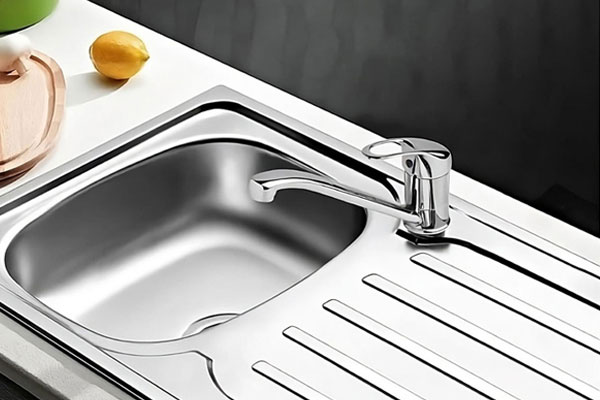
For those living in hard water areas, limescale build up is especially common and regular use of a limescale remover is essential.
How Limescale Forms and Where It Is Found
Limescale formation is a natural process that occurs when water, rich in minerals like calcium and magnesium, evaporates and leaves behind these minerals on surfaces.
In the bathroom, limescale can be seen as a white, chalky residue on taps, showerheads, and tiles. Kitchens are not spared either, with kettles, coffee machines, and steam ovens being prime spots for limescale accumulation. Even your washing machine can suffer from limescale build-up, affecting its efficiency and the longevity of your clothes.
Water-using appliances are particularly vulnerable to limescale, which can clog pipes and reduce heating efficiency, leading to higher energy bills and potential appliance breakdowns. Regular inspection and cleaning of these appliances are essential to prevent limescale from taking a toll on their performance and lifespan.
Understanding where limescale forms in your home helps in targeting your cleaning efforts more effectively. Using a specialized remover in these areas can prevent build-up, ensuring your appliances and surfaces remain clean and efficient.
The Importance of Regular Limescale Removal for Appliance Longevity
Did you know that limescale build-up in your appliances can lead to higher energy bills? It's true. Appliances like washing machines and dishwashers work less efficiently when they're fighting through layers of limescale.
Regular limescale removal is not just about keeping your home looking its best; it's also about safeguarding the longevity and performance of your household appliances too.
Think about your coffee machine. It's something you might use every day. When limescale clogs its system, it doesn't just slow down; it can also affect the taste of your coffee. Regularly descaling it with a limescale remover like the Caple Eco Descaler keeps it working as it should and your coffee tasting great.
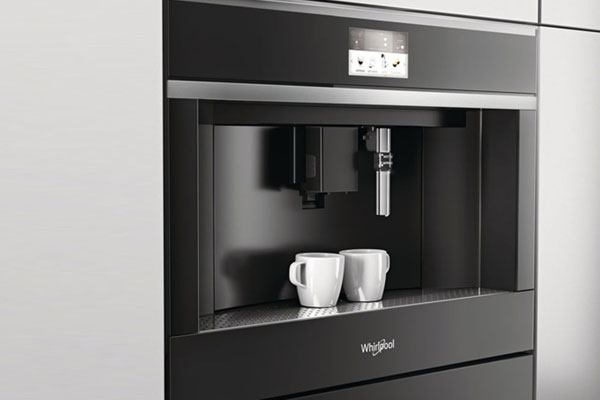
For appliances that heat water, like kettles and boilers, limescale can act as an insulator. This means they need more energy to heat the same amount of water. Removing limescale allows these appliances to heat water more efficiently, saving energy and reducing wear and tear.
Lastly, appliances free of limescale are less likely to need repairs. This not only saves money in the long term but also avoids the hassle of dealing with broken appliances. A simple routine of limescale removal can keep everything running smoothly and extend the lifespan of your household gadgets.
Quooker Taps In Hard Water Areas
If you've splashed out on a superb quality Quooker Hot Tap you certainly do not want limescale to effect its performance.
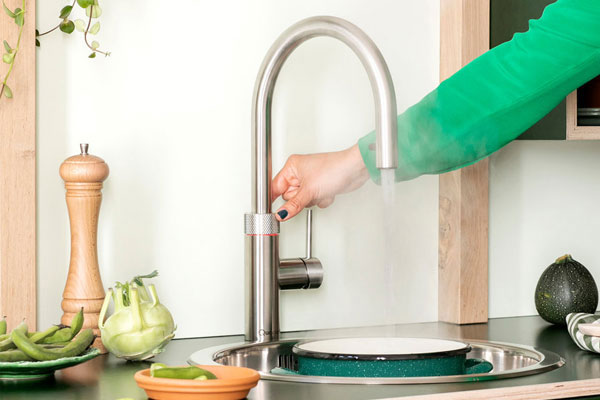
Quooker have developed a Scale Control Kit which is designed to prolong the life of the Quooker Tank while also improving the taste of the water. This clever system is essential for those living in hard water areas as it helps to prevent the build up of limescale inside the Quooker System itself.
An audible alarm lets you know when the cartridge needs to be replaced. The cartridge can be returned to Quooker where it will be refurbished, recycled and re-used making it a sustainable choice.
DIY Solutions and Natural Alternatives For Cleaning Limescale
Turning to DIY solutions and natural alternatives for limescale removal is not just about saving money; it's also about embracing a more eco-friendly way of cleaning. Many store-bought cleaners contain harsh chemicals that can harm the environment. By using ingredients you likely already have in your kitchen, you can create effective limescale removers that are kind to the planet.
Vinegar and lemon juice are powerful natural acids that can break down limescale without the need for synthetic chemicals. These natural alternatives are not only safe for you and your family but also for the environment. Plus, they leave your home smelling fresh and clean.
Homemade Limescale Removers
For a gentle, natural way to tackle limescale, especially on taps, try using a mixture of vinegar and lemon juice. These ingredients are effective because the natural acidity of both ingredients dissolves limescale without the need for harsh chemicals.
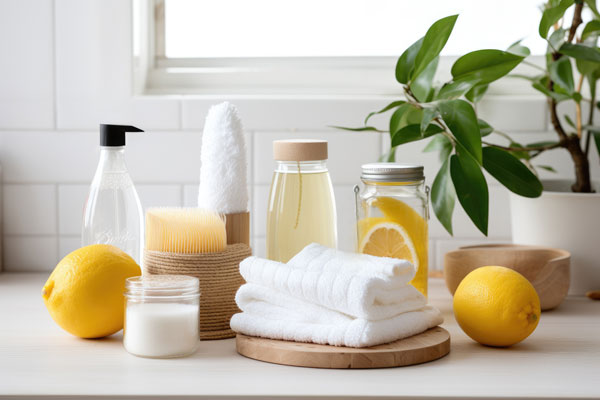
DIY Eco Friendly Limescale Remover For Tap Cleaning
- Step 1: Mix equal parts of white vinegar and lemon juice in a bottle.
- Step 2: Soak a cleaning cloth in the mixture.
- Step 3: Wrap the cloth around the tap, ensuring it's fully covered. Secure with an elastic band or string.
- Step 4: Leave it for an hour before wiping clean (a toothbrush is good to use if it needs more rigorous clean)
This method not only removes limescale but also leaves your taps shining and smelling fresh. It's great for use around stainless steel sinks too, simply follow the steps above but place the cloth over the plug hole and leave to soak for up to an hour.
This homemade remedy is perfect for those looking for a biodegradable, non-toxic option for limescale removal. It's a testament to the power of plant-based cleaning solutions.
By using simple, natural ingredients, you're choosing a safer and more environmentally friendly way to keep your home limescale-free. Plus, it's cost-effective, reducing the need for expensive, chemical-laden cleaners.
Baking Soda for Tough Limescale Stains
Baking soda is a versatile cleaner that's especially effective for tackling tough limescale stains. Its mild abrasive texture makes it perfect for scrubbing away hard water build-up without scratching surfaces. To use baking soda for limescale removal, simply make a paste by mixing it with water.
Apply the paste directly onto the limescale stains and let it sit for a few hours, or even overnight for particularly stubborn areas. The baking soda works to break down the limescale, making it easier to scrub away. After letting it sit, use a brush or cloth to scrub the area gently, then rinse with water.
This method is not only effective but also safe and non-toxic, making it ideal for use in homes with pets or children. Baking soda is a natural, biodegradable material, which means you're choosing an eco-friendly option for cleaning your home.
Regular Cleaning and Maintenance Tips To Prevent Limescale Built Up
To keep your kitchen and other parts of your home free from limescale, regular cleaning and maintenance are key. Here are four simple tips to keep limescale at bay:
- Start by wiping down surfaces with a damp cloth after use, especially in areas prone to water exposure. This simple step can prevent limescale from forming.
- For appliances like kettles and coffee makers, which are hotspots for limescale buildup, running a cycle with a mixture of equal parts water and white vinegar once a month can work wonders. It's a safe and effective way to descale appliances without harsh chemicals.
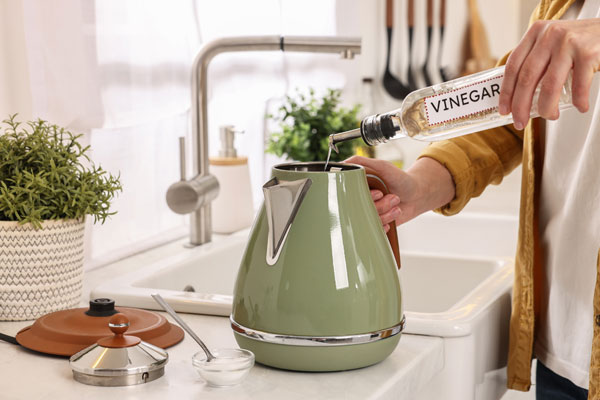
- Shower heads and taps often suffer from limescale accumulation. They can be soaked in a vinegar solution for a few hours or overnight for a thorough clean. Remember to rinse them well afterwards to remove any vinegar smell.
- Lastly, don't overlook the importance of descaling your iron. Limescale can damage the plate and affect its performance. Using distilled water in your iron instead of tap water can reduce limescale formation, keeping your clothes spotless and your iron in good working order.
If you live in a hard water area and are searching for the best kitchen taps to deal with the higher calcium levels, please get in touch.
We have a great selection of filtered water taps on offer, some models have the option to upgrade to a high resin filter specifically designed for hard water. Don't want to change your existing tap? Check out the Abode Swich High Resin Water Filter Diverter. It's a game changer!





